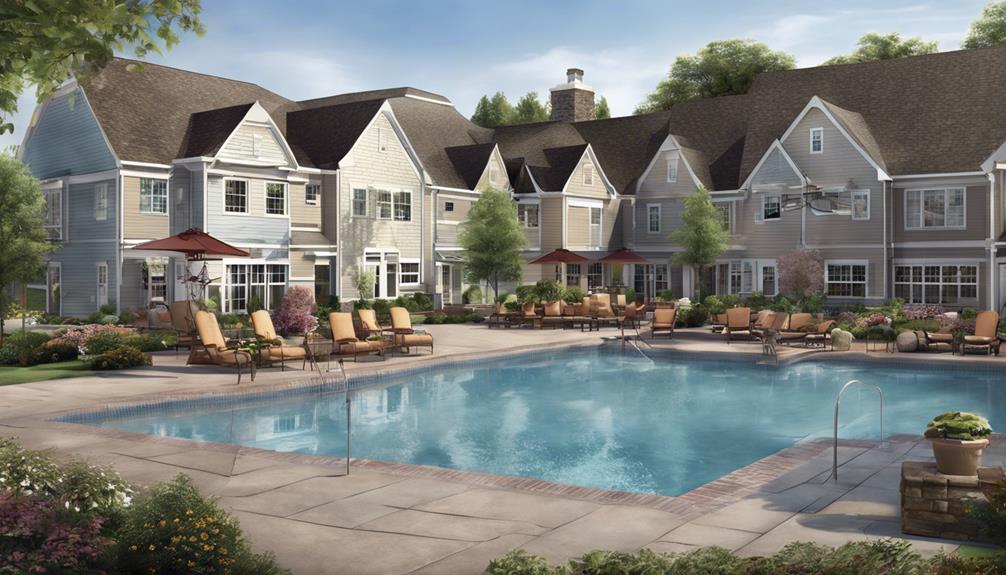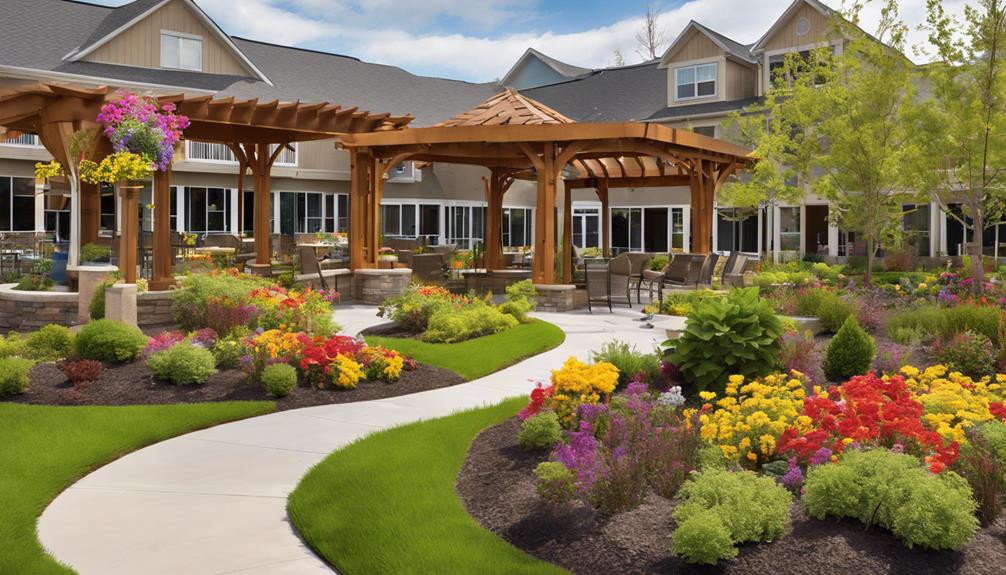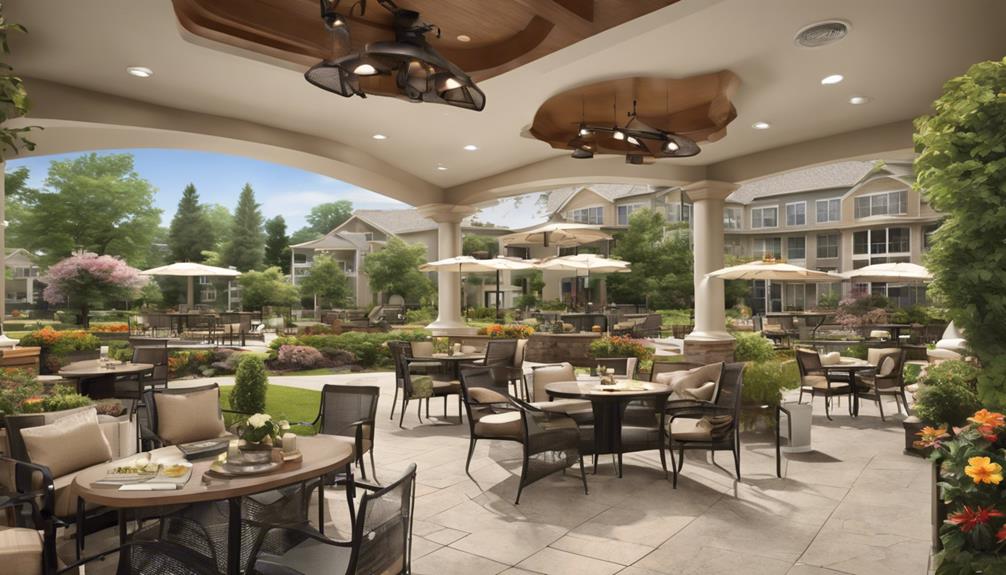Retirement living communities offer different options like assisted living, independent living, memory care, and skilled nursing. Assisted living communities provide aid for daily tasks. Nursing homes offer full-time nursing and rehab. Continuing Care Retirement Communities have a range of care services and financial stability. Independent living caters to self-sufficient seniors with personal apartments and community activities. Memory care caters to those with cognitive impairments. Skilled nursing offers advanced medical care 24/7. Consider care needs, amenities, and costs when choosing a community. These options cater to different needs and preferences as seniors age. More details provide a fuller understanding.
Key Takeaways
- Assisted living, nursing homes, and CCRCs offer varying levels of care and services.
- Independent living provides autonomy with shared amenities and social activities.
- Memory care communities offer specialized support for cognitive impairments.
- Skilled nursing care ensures advanced medical attention and rehabilitation services.
- Financial planning is crucial to afford retirement living options.
Overview of Retirement Living Communities
Retirement living communities encompass a variety of options, including assisted living communities, nursing homes, and Continuing Care Retirement Communities (CCRCs), providing tailored care for older individuals. Assisted living communities offer support with daily activities like bathing and medication management, fostering independence while ensuring safety. Nursing homes, on the other hand, provide extensive medical care and assistance for individuals with more complex health needs, including round-the-clock nursing care and rehabilitation services.
Continuing Care Retirement Communities (CCRCs) stand out as all-encompassing options, offering a continuum of care that adapts to residents' changing needs over time. These communities often require an entrance fee, providing access to a range of services from independent living to skilled nursing care within the same campus. While CCRCs tend to have higher costs upfront, they can offer financial predictability and a sense of security for individuals seeking a long-term care solution.
Types of Independent Living Options

Several distinct types of independent living options cater to older individuals who seek a vibrant and self-sufficient lifestyle. Independent living communities are designed for seniors who don't require medical care but desire a social environment and various amenities.
These communities offer private apartments with kitchen facilities to promote independence. The monthly rent for independent living communities typically ranges from $1,500 to $3,500, depending on the location and services included. Residents in these communities can enjoy activities, dining options, transportation services, and housekeeping assistance as part of the amenities and services provided.
Living in an independent living community fosters a sense of community while allowing seniors to maintain their independence. It's a great option for older individuals who seek a supportive environment without the need for extensive medical care.
Services Offered in Assisted Living
Assisted living communities offer a range of care services to assist residents with daily activities like dressing and bathing.
These communities also provide wellness programs to promote physical and mental well-being among residents.
Additionally, dining options in assisted living facilities guarantee that residents receive nutritious meals tailored to their dietary needs.
Care Services Provided
Assisted living communities enhance residents' daily lives through a range of supportive services. They offer a variety of care services to support residents in their day-to-day activities. Some services provided in assisted living include assistance with daily activities such as grooming, medication management, and meal preparation. Additionally, they provide housekeeping, laundry, and transportation services for residents' convenience. Social activities, fitness programs, and outings are organized to promote well-being and social interaction.
Trained staff members in assisted living communities also offer specialized care for early-stage memory loss and dementia in dedicated memory care communities. These services focus on maintaining residents' independence while ensuring they receive the necessary support for a comfortable and enriching lifestyle.
Wellness Programs Available
Enhancing residents' overall well-being, assisted living communities offer a range of wellness programs aimed at promoting physical, mental, and emotional health. These programs in assisted living include fitness classes, yoga sessions, and group exercises to enhance physical health.
Additionally, nutritional counseling, meal planning, and dietary support are often provided to guarantee residents maintain a balanced diet. Mental health support is also prioritized through therapy sessions, cognitive stimulation activities, and memory enhancement programs.
To further promote holistic care, assisted living communities offer social activities, educational seminars, and emotional support. Wellness programs in assisted living focus on a holistic approach to care, encompassing various facets of well-being to enhance residents' quality of life.
Dining and Nutrition Options
Regularly enjoying nutritious and balanced meals in communal dining areas is a key aspect of the dining and nutrition options available in assisted living communities. Assisted living communities offer customized meal plans tailored to residents' dietary needs and preferences.
Here are some key points to ponder:
- Customized Meal Plans: Residents benefit from personalized meal plans that cater to their specific dietary requirements.
- Communal Dining Areas: Meals are served in shared dining spaces, fostering social interaction and a sense of community.
- Specialized Diets: Assisted living facilities accommodate specialized diets like diabetic-friendly or heart-healthy options, ensuring residents' diverse needs are met.
In assisted living communities, dining services prioritize promoting overall health and well-being through delicious and nutritious food choices.
Memory Care for Cognitive Impairments

Specializing in providing tailored care for seniors with cognitive impairments like Alzheimer's disease, memory care communities offer round-the-clock support and personalized attention to guarantee residents' well-being and safety. Within these communities, specially trained staff members are available 24/7 to monitor and assist residents.
Activities are thoughtfully designed to stimulate memory functions and support cognitive health. Additionally, memory care communities provide secure environments to prevent wandering and guarantee the safety of individuals with cognitive impairments. Residents may also benefit from therapies such as music therapy and reminiscence activities, which are incorporated to enhance their quality of life. Caregivers and staff in these communities are trained in understanding mild cognitive impairment and tailoring care to the unique needs of each resident. This personalized approach ensures that individuals receive the proper support while maintaining as much independence as possible. Social activities and daily routines are also crafted to encourage engagement, improve mood, and foster a sense of belonging.
Skilled Nursing Care Explained

Skilled nursing care is an essential service that provides advanced medical treatment for seniors who've experienced illness, injury, or surgery. This type of care is often necessary post-hospitalization to support ongoing recovery and treatment.
With round-the-clock staffing by medical professionals, including nurses and therapists, skilled nursing communities prioritize resident well-being and rehabilitation services to enhance strength and mobility.
Nursing Care Services
After experiencing a serious medical event, seniors may require advanced medical care provided by skilled nursing communities for their rehabilitation and recovery. Skilled nursing communities offer a range of services to support seniors in need, such as:
- 24/7 monitoring by trained nurses and medical professionals
- Rehabilitation services focusing on regaining strength and independence
- Support following a hospital stay to aid in recovery
These communities aim to provide a safe and nurturing environment for seniors to heal and regain their health.
Medical Treatment Options
Investigating the domain of medical treatment options within retirement communities reveals a thorough approach to skilled nursing care for individuals in need of advanced support. Skilled nursing care in these communities provides 24/7 nursing care and rehabilitation services for residents recovering from illness, injury, or surgery. These facilities have on-site therapists and medical professionals to aid in recovery. Residents in skilled nursing facilities receive personalized care plans tailored to their specific medical needs and conditions.
This level of care is designed for individuals requiring a higher level of medical attention than what's typically provided in assisted living or independent living settings. Skilled nursing communities offer a holistic approach to medical treatment, ensuring residents receive the specialized care they need for optimal recovery and well-being.
Professional Care Staff
Upon recovery from illness, injury, or surgery, residents in retirement communities benefit from the expertise of professional care staff in skilled nursing facilities. These facilities offer specialized care provided by registered nurses, licensed practical nurses, and certified nursing assistants, ensuring residents receive advanced medical attention 24/7.
The staff in skilled nursing communities are trained to address various conditions like Alzheimer's and dementia, tailoring their care to meet individual needs. Additionally, skilled nursing facilities provide rehabilitation services aimed at helping residents recover and regain independence following medical events.
Residents can rest assured that they're in capable hands with the dedicated and compassionate professional care staff in these skilled nursing facilities.
Amenities in Retirement Communities

In retirement communities, residents can enjoy a variety of amenities designed to promote an active and engaging lifestyle. Assisted living services cater to those needing extra support, ensuring a comfortable living environment.
Activities like fitness centers, swimming pools, and walking trails encourage physical well-being and social interaction among residents. On-site dining options such as restaurants and cafes not only provide convenience but also foster a sense of community through shared meals.
Housekeeping services, laundry facilities, and transportation assistance are often available to meet residents' daily needs and enhance their quality of life. Recreational amenities like game rooms, libraries, and hobby spaces offer opportunities for social engagement and leisure activities.
Additionally, wellness amenities such as spas, yoga studios, and fitness classes contribute to residents' overall health and well-being. These amenities collectively create a supportive and vibrant environment for retirees to thrive and enjoy their golden years to the fullest.
Choosing the Right Community

When selecting the ideal retirement community, it's important to carefully assess the financial stability, reputation, and suitability of the facility to meet specific care and lifestyle needs. Ensuring that the retirement community aligns with your preferences and requirements is vital for a comfortable living experience.
Here are some key factors to ponder when choosing the right senior living community:
- Assisted Living: Evaluate if the community offers assisted living services for those who may need extra help with daily activities.
- Senior Housing Options: Look into the different housing options available, such as independent living, assisted living, or memory care, to find the best fit for your needs.
- Choosing the Right Senior: Consider the social environment of the community and whether it fosters a sense of belonging and companionship for you or your loved one.
Financial Considerations for Retirement Living

Considering the financial implications of retirement living is essential for planning a secure and comfortable future. When exploring retirement living options, it's vital to understand the costs involved.
For instance, assisted living facilities can have a monthly average cost of around $4,300 for a private room in 2020. On the other hand, continuing care retirement communities may require entrance fees ranging from $329,000 to $1 million, depending on the location, amenities, and services offered. Long-term care riders are also worth considering as they can provide financial assistance for long-term care needs and can be added to existing life insurance policies.
Keep in mind that the costs of retirement communities can vary based on factors like apartment size, location, and included amenities. It's important to carefully assess your financial situation and consider all these factors when planning for your retirement living to ensure a financially stable and fulfilling future.
Frequently Asked Questions
What Are the Disadvantages of a Ccrc?
Disadvantages of CCRCs include high upfront costs, substantial monthly fees, limited contract flexibility, potential fee increases, and the need to move within the community based on health changes. Strict eligibility criteria may also restrict access.
What Are the Disadvantages of Living in a 55 Plus Community?
We find limited age diversity in 55 plus communities. This can lead to feeling disconnected from younger generations and missing out on diverse social interactions. It is crucial to take into account these drawbacks when selecting a living environment.
What Are the Three Basic Types of Contracts for Ccrcs?
We have Type A Contracts with no monthly fee changes, Type B with increased fees for higher care, and Type C with pay-as-needed care costs. Understanding these contract types is important for choosing the right CCRC.
What Is the Main Advantage to a Ccrc?
The main advantage of a CCRC is the smooth shift of care levels as needs evolve. Residents benefit from long-term care availability without relocating. Convenience, peace of mind, community support, and tailored amenities enhance our lives.
Conclusion
To sum up, retirement living communities are like a large, supportive family where residents can thrive and enjoy their golden years. With various options for independent living, assisted living, memory care, and skilled nursing, there's something for everyone.
Amenities and services cater to the needs and preferences of residents, creating a comfortable and fulfilling environment. When selecting the right community, consider location, amenities, care services, and financial considerations to guarantee a smooth shift into retirement living.









